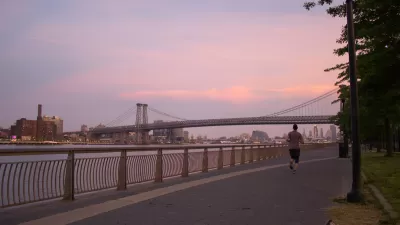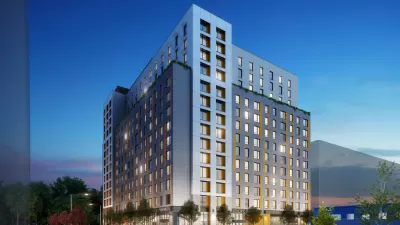Alan G. Brake writes an editorial calling on the architecture and urbanism fields to push even further to reduce carbon emissions by designing (and upgrading) efficient buildings.
Alan G. Bake cites the memory of Hurricane Sandy and the People's Climate March in an appeal to architects and other urbanism professionals to move beyond their already substantial leadership on the issue:
Climate change is one area where the architecture/design/urbanism communities have taken the lead. The professions can and must do much more. In already dense areas, like New York, improving the efficiency of our buildings has the greatest potential to reduce our already modest (by U.S. standards) emissions.
Brake joins the American Institute of Architects New York chapter in supporting a climate change plan announced recently by New York Mayor Bill de Blasio:
Nearly three quarters of the city’s greenhouse gases can be traced to its buildings. As a first step, the mayor created a plan to upgrade 3,000 city owned buildings, and pledged to work with the private sector in incentivize efficiency upgrades. Though these upgrades will come with upfront costs, the city estimates a savings of $1.4 billion in energy costs by 2025.
FULL STORY: Editorial>Real Change for a Changing Planet

Alabama: Trump Terminates Settlements for Black Communities Harmed By Raw Sewage
Trump deemed the landmark civil rights agreement “illegal DEI and environmental justice policy.”

Planetizen Federal Action Tracker
A weekly monitor of how Trump’s orders and actions are impacting planners and planning in America.

How Atlanta Built 7,000 Housing Units in 3 Years
The city’s comprehensive, neighborhood-focused housing strategy focuses on identifying properties and land that can be repurposed for housing and encouraging development in underserved neighborhoods.

In Both Crashes and Crime, Public Transportation is Far Safer than Driving
Contrary to popular assumptions, public transportation has far lower crash and crime rates than automobile travel. For safer communities, improve and encourage transit travel.

Report: Zoning Reforms Should Complement Nashville’s Ambitious Transit Plan
Without reform, restrictive zoning codes will limit the impact of the city’s planned transit expansion and could exclude some of the residents who depend on transit the most.

Judge Orders Release of Frozen IRA, IIJA Funding
The decision is a victory for environmental groups who charged that freezing funds for critical infrastructure and disaster response programs caused “real and irreparable harm” to communities.
Urban Design for Planners 1: Software Tools
This six-course series explores essential urban design concepts using open source software and equips planners with the tools they need to participate fully in the urban design process.
Planning for Universal Design
Learn the tools for implementing Universal Design in planning regulations.
Caltrans
Smith Gee Studio
Institute for Housing and Urban Development Studies (IHS)
City of Grandview
Harvard GSD Executive Education
Toledo-Lucas County Plan Commissions
Salt Lake City
NYU Wagner Graduate School of Public Service





























